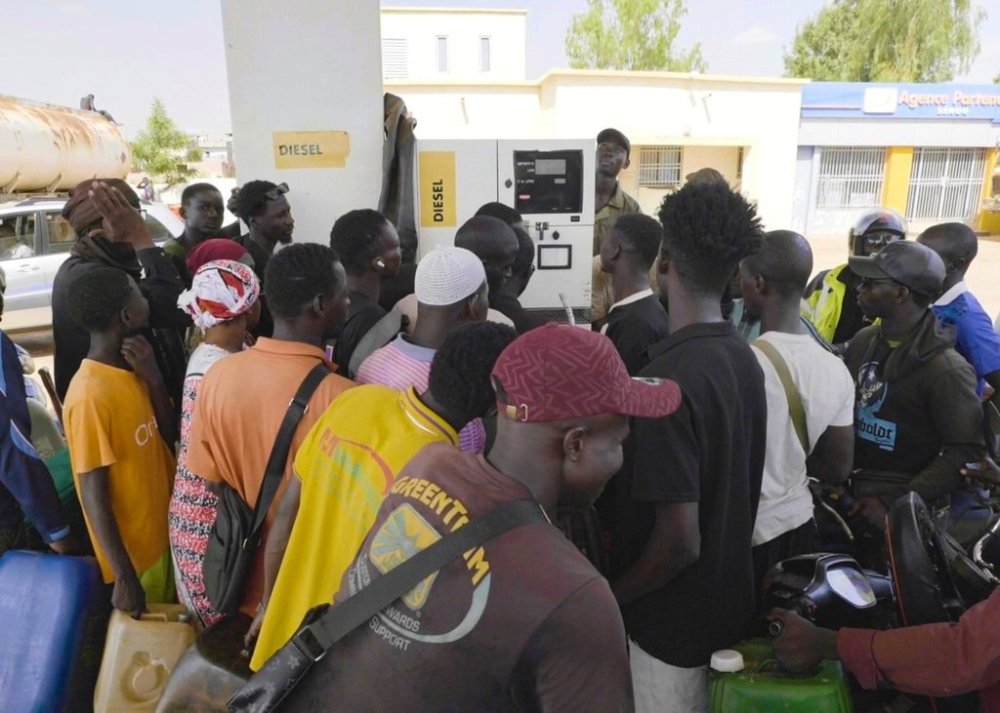Militants are squeezing Mali with a fuel blockade. Here’s what to know
Advertisement
Read this article for free:
or
Already have an account? Log in here »
To continue reading, please subscribe:
Monthly Digital Subscription
$0 for the first 4 weeks*
- Enjoy unlimited reading on winnipegfreepress.com
- Read the E-Edition, our digital replica newspaper
- Access News Break, our award-winning app
- Play interactive puzzles
*No charge for 4 weeks then price increases to the regular rate of $19.00 plus GST every four weeks. Offer available to new and qualified returning subscribers only. Cancel any time.
Monthly Digital Subscription
$4.75/week*
- Enjoy unlimited reading on winnipegfreepress.com
- Read the E-Edition, our digital replica newspaper
- Access News Break, our award-winning app
- Play interactive puzzles
*Billed as $19 plus GST every four weeks. Cancel any time.
To continue reading, please subscribe:
Add Free Press access to your Brandon Sun subscription for only an additional
$1 for the first 4 weeks*
*Your next subscription payment will increase by $1.00 and you will be charged $16.99 plus GST for four weeks. After four weeks, your payment will increase to $23.99 plus GST every four weeks.
Read unlimited articles for free today:
or
Already have an account? Log in here »
BAMAKO, Mali (AP) — The landlocked West African nation of Mali is being squeezed by a weekslong blockade on fuel imports imposed by jihadi militants, an unusual strategy as the insurgent threat grows across the region.
The government announced school closures, embassies ordered citizens to evacuate and citizens have gone hours without power. The blockade has been a major setback for Mali’s military junta in a country that relies on fuel imports from neighboring Senegal and Ivory Coast.
As the blockade approaches its third month, here’s what to know:

Militants imposed the blockade to fight back against the military
Mali, a country of 25 million people, has battled jihadi militants for several decades, alongside neighboring Burkina Faso and Niger.
Militants from the al-Qaida-backed Jama’at Nusrat al-Islam wal-Muslimin (JNIM) group announced a ban on fuel imports from neighboring countries into Mali in early September, after authorities said early this year they were cutting down fuel supplies to remote areas as a measure to squeeze the jihadis in their hideouts.
The blockade has squeezed Mali’s fragile economy and left hundreds of fuel trucks stranded at the border.
Evacuation orders
In response to the blockade, several foreign missions have asked their citizens to leave immediately via commercial air travel if possible. The U.S. embassy asked all citizens to “depart immediately” on Tuesday, warning of the hardship likely worsening in coming weeks.
Australia, Italy, Germany and Japan have also called on their nationals to leave Mali over the situation, worsening tensions and fears among some in the country.
Worsening hardship
Despite being one of Africa’s top gold producers, Mali is ranked the sixth least developed nation in the world, with nearly half its population living below the national poverty line.
The fuel blockade has hiked commodity prices, worsening living condition for millions.
In Mali’s capital, Bamako, endless queues have stretched in front of gas stations with some residents spending nights waiting.
Mali’s military has attempted to escort fuel trucks from border areas to Bamako while also targeting JNIM locations with airstrikes. Some trucks have made it to the capital but others have been attacked by militants.
The military is hampered by the lack of air power, said Oluwole Ojewale with the Institute for Security Studies.
Neighborhoods in Bamako and other parts of Mali are also beginning to experience prolonged power outage due to the fuel crisis. Some places have electricity for only six hours while several other areas are going weeks without power supply.
In the city of Mopti in central Mali, residents have been without electricity for over a month. “People are living without electricity, and the few houses or government offices that do have electricity are powered by solar panels,” said Issa Guindo, a resident of Mopti.
Education Minister Amadou Sy Savane announced late Sunday that schools nationwide will be shut for two weeks because the scarcity of fuel makes it difficult for staff to get to work, as is the case with most other workers.
Militants show strength
JNIM is the most potent armed group in the Sahel, a vast strip of semi-arid desert stretching from North Africa to West Africa. Observers say the militants are using the fuel blockade as a show of force despite Malian military strikes against them.
The militants have targeted transport companies along major roads, forcing some of them to stop fuel operations.
According to Beverly Ochieng, an analyst at the Control Risks Group consulting firm, the blockade is used as a tool to pressure commercial operators and residents to distance themselves from the military authorities, therefore undermining the legitimacy and authority of Mali’s military government.
Challenge for military junta
Military leaders in Mali staged a coup in 2020, saying it was necessary to end decades of security crises.
Following similar coups in neighboring Niger and Burkina Faso, Mali expelled French forces and turned to Russia’s mercenary units to help them fight jihadis. However, despite Russia’s support and a security partnership with its two neighbors, analysts and conflict data suggest the crisis has worsened in Mali.
Some of the attacks in Mali this year have been the deadliest in more than three years, according to an assessment by the U.S.-based Armed Conflict Location & Event Data Project, pointing to trends of attacks that often targeted security forces.
JNIM, in particular, is deliberately trying to destabilize the governments in the three Sahel countries, the group said in a report.
___
Follow AP’s Africa coverage at: https://apnews.com/hub/africa

